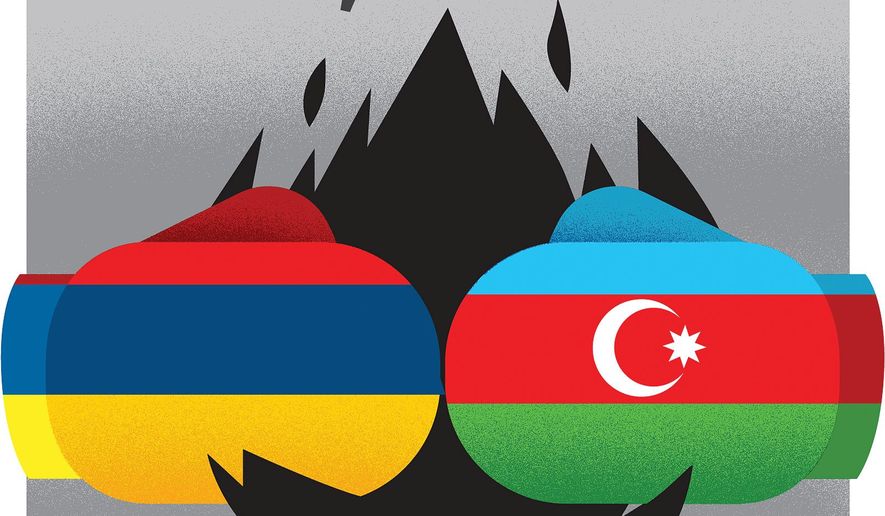Halting the conflict between Armenia and Azerbaijan
Russian peacekeeping is not the solution
Svante E. Cornell
October 20, 2020
ANALYSIS/OPINION:
On Oct. 14, Russian Foreign Minister Sergey Lavrov proposed that Russian peacekeepers or observers should be deployed to halt the current conflict between Armenia and Azerbaijan, which broke out into open hostilities in late September. Yet, there’s good reason for the West to be wary of this idea. Russian peacekeepers would do nothing to resolve the conflict, and only serve to give Moscow another lever through which to pressure both Armenia and Azerbaijan, thus undermining the corridor across the South Caucasus linking Europe with Central Asia.
In the past two weeks, several hundred people (including dozens of civilians) have been killed on both sides of the renewed conflict over Nagorno-Karabakh, a majority-Armenian enclave inside internationally recognized Azerbaijani territory. The conflict has risked triggering the involvement of Russia, Turkey and Iran. Given its proximity to Europe, quelling it has understandably become a high priority, and the need for international intervention is overdue.
The problem is that Russian peacekeepers would violate the first principle of the Hippocratic oath: “Do no harm.” For 30 years, Moscow has sought to manipulate the Armenia-Azerbaijan conflict to its advantage, and the experience that neighboring countries have had with Russian peacekeepers should serve as a strong deterrent.
The Armenia-Azerbaijan conflict is unique in many ways — including the fact that no peacekeepers have ever been deployed along the line of contact between the two armies. This is no accident. Back in 1994, Moscow negotiated a ceasefire between the two parties that ended the “hot” phase of their war. But as international organizations sought to mount a peacekeeping mission, Russia insisted it would take part. This, of course, would violate United Nations peacekeeping guidelines, which insist that neighboring countries should never serve as peacekeepers. And because no other country felt safe sending peacekeepers where Russian troops would be present, no peacekeeping mission ever materialized.
Interestingly, this is one of the few things that both Armenia and Azerbaijan have ever agreed on. Back in 1994, both quietly opposed any deployment of Russian forces into the conflict. The reason was simple: Both knew better than anyone how Moscow had manipulated this conflict from the start. This was true in Soviet times, when Moscow supported Azerbaijan against a wayward Armenia. It was even more true after independence, when Moscow shifted to support Armenia when a nationalist president was elected in Azerbaijan.
Moscow’s behavior in recent years does not indicate that much has changed. In what must be a first in international mediation, Russia is, on one hand, a co-chair of the international body tasked with mediating the conflict — the Minsk Group of the Organization for Security and Cooperation in Europe. Simultaneously, however, Russia has been providing large amounts of weaponry to both parties in the conflict. The main difference? Armenia, a member of the Russia-led Collective Security Treaty Organization, has paid next to nothing for these weapons, whereas independent-minded and oil-rich Azerbaijan has paid world market prices.
In the past 30 years, the track record of Russian peacekeepers has given birth to a witticism: Russian peacekeeping is all about keeping the pieces. If Armenia and Azerbaijan need any reminders, they can ask their common neighbor, Georgia. Before the 2008 Russian invasion of that country, Russian peacekeepers in the Georgian breakaway territory of South Ossetia were engaged in the training and organization of paramilitary forces in that territory, which subsequently triggered the conflict by shelling Georgian villages. Russia then invaded Georgia, and now has more than 3,000 troops inside South Ossetia.
Armenian Prime Minister Nikol Pashinyan has signaled Armenia’s willingness to consider Russian peacekeepers. This is understandable, given Armenia’s setbacks in the current fighting. But Mr. Pashinyan should be careful: The deployment of Russian peacekeepers could, in practice, lead to Russian administration over Nagorno-Karabakh, the very territory Armenia is fighting for.
This may seem outlandish today. Yet back in 1989, when the troubles started, the Soviet regime for some time applied direct administration over Nagorno-Karabakh. Only last year, that model was resuscitated by Modest Kolerov, a former adviser to Russian President Vladimir Putin and the head of the Gazprom-affiliated Regnum news agency.
Mr. Kolerov claimed that Nagorno-Karabakh faced either incorporation into Armenia or military conquest by Azerbaijan. Neither option, he argued, would provide the territory with its purported right to a “dignified state existence.” His solution was for Nagorno-Karabakh to have a form of statehood under Russian tutelage, outside either Armenia or Azerbaijan — something similar, perhaps, to that of Abkhazia and South Ossetia in Georgia, or Transnistria in Moldova.
Mr. Lavrov’s suggestion of Russian peacekeepers may very well be the first step in applying the Kolerov model to Nagorno-Karabakh — something that would freeze the conflict and give Moscow enormous influence over both Armenia and Azerbaijan. This is not the way forward. It has been clear for years that the festering conflict over Nagorno-Karabakh was primed to explode sooner or later, and Western policy shares part of the blame, not least because it has tolerated Russia’s role as a co-mediator while Moscow has simultaneously been manipulating the conflict. Simply put, Russian policies are a key reason for the violence we are witnessing presently. A greater Russian role is therefore definitely not the solution.
What, then, is? The conflict requires a serious international effort that aspires not only to freeze the conflict anew, but to resolve it once and for all. This can only be achieved by a joint U.S. and EU effort that combines American hard power to provide security, and the EU’s financial clout for the reconstruction of the conflict zone.
Anything less amounts to a dangerous half-measure — and an opening for Moscow.
• Svante E. Cornell is the director of the American Foreign Policy Council’s Central Asia-Caucasus Institute, co-founder of the Institute for Security and Development Policy and a Policy Advisor to JINSA’s Gemunder Center for Strategy.

